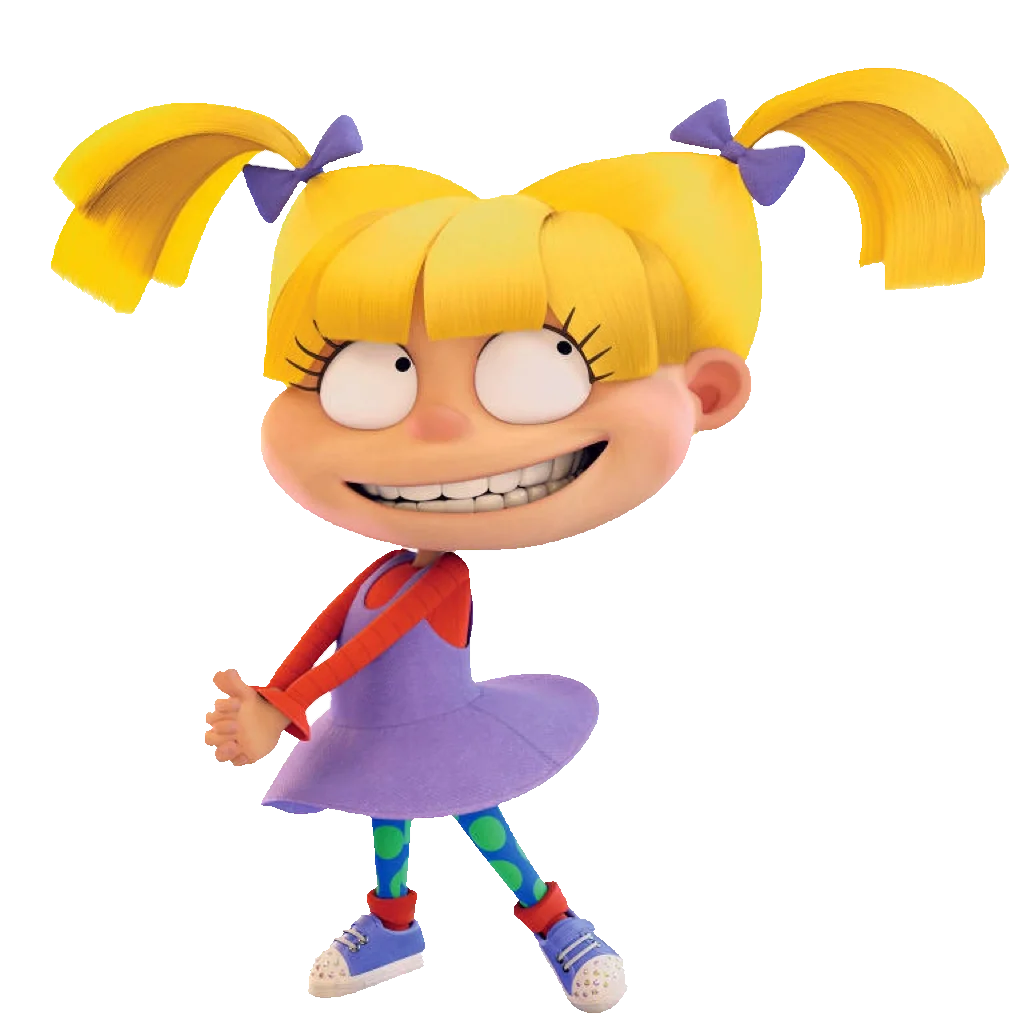Angelica Pickles: A Complex Rugrats Character
Character Overview
Angelica Charlotte Pickles, the three-year-old cousin of Tommy and Dil Pickles, is instantly recognizable with her blonde hair and signature blue dress. Daughter of the wealthy Drew and Charlotte Pickles, her privileged background ironically fuels her spoiled and manipulative behavior. Feeling neglected by her career-obsessed parents, she seeks attention through bullying her younger cousins and friends. Her sharp wit, often delivered with a sassy smirk, quickly established her as a memorable and complex character in the beloved Nickelodeon series, Rugrats. This seemingly simple character design belies a depth that has captivated audiences for decades, sparking both adoration and criticism in equal measure.
Family Background
- Parents: Drew and Charlotte Pickles prioritize their careers over family, creating a significant void in Angelica's life. Their absence, both physical and emotional, is a constant presence in Angelica's story, shaping her behavior and underlying insecurities. This parental neglect is a key element in understanding her actions and motivations.
- Cousins: Tommy and Dil Pickles are frequent targets of Angelica's schemes and manipulations. Their unwavering presence, despite Angelica's often cruel treatment, provides a fascinating counterpoint to her character. Their innocent nature highlights the stark contrast between a child with abundant love and a child starved for it.
- Aunt and Uncle: Didi and Stu Pickles provide a stark contrast in parenting styles, highlighting the detrimental effects of Angelica's parents' neglect. Didi and Stu's loving and attentive parenting serves as a benchmark against which Angelica's upbringing is measured, further emphasizing the importance of emotional support in childhood development. The difference in parenting styles is a recurring theme, showcasing the positive impacts of a nurturing environment.
Character Traits
Often labeled the quintessential "mean girl," Angelica exhibits several key personality traits that are both engaging and disturbing to the audience. Her actions are often reprehensible, yet her cleverness and sharp wit make her undeniably fascinating.
- Manipulative: She cleverly uses her intelligence and wit to deceive others and get her way. Angelica's manipulative tactics are often incredibly effective, showcasing her cunning and strategic thinking, even at a young age. This intelligence is frequently used for selfish gain, creating a dynamic tension with her other personality traits.
- Self-Centered: A strong sense of entitlement and a lack of empathy define her interactions. Her self-centeredness stems from a deep-seated need for attention, a need that is constantly unfulfilled due to her parents' neglect. This lack of empathy often leads to callous behavior, yet it's never presented without the underlying context of her emotional deprivation.
- Jealous: Her intense rivalry with Susie Carmichael reveals underlying insecurities and a need for validation. This rivalry is more than just petty competition; it's a reflection of Angelica's insecurities and her desperate need for attention and approval. Susie, with her own strong personality and supportive family, represents everything Angelica lacks.
However, beneath her harsh exterior lies a surprising vulnerability that resonates with audiences and adds depth to her character. This vulnerability is often subtly revealed through fleeting moments of insecurity, loneliness, or even unintentional kindness. It's these glimpses of humanity that prevent Angelica from becoming a purely one-dimensional villain.
Thematic Elements
Angelica's role extends beyond simple antagonism; she embodies several significant themes within the show, making her a far more complex and thought-provoking character than a simple "bad kid."
Childhood Psychology
- Attention-Seeking Behavior: Her bullying can be interpreted as a desperate cry for attention stemming from parental neglect. This interpretation adds layers of complexity to her actions, reframing them as a consequence of her emotional environment rather than simply innate cruelty.
- Social Dynamics: Her complex interactions with other children illuminate the intricacies and challenges of childhood relationships. Angelica's relationships with Tommy, Chuckie, Phil, Lil, and Susie, showcase the wide spectrum of childhood social dynamics, from bullying and rivalry to fleeting moments of genuine connection.
Family Dynamics
- Neglect vs. Affection: The stark contrast between Angelica's material wealth and emotional deprivation underscores the importance of genuine parental connection. The show subtly highlights the detrimental effects of a privileged upbringing devoid of emotional support, contrasting it with the positive outcomes of a loving family environment.
- Contrast with Tommy's Family: Comparing Angelica's family with the loving Pickles family highlights the crucial role of emotional bonds in healthy child development. This comparison makes the impact of her upbringing even more pronounced, providing a clear illustration of the difference between a stable and supportive family and one marked by neglect and emotional distance. It illustrates the importance of parental love and involvement in a child's development.
Cultural Impact
Iconic Status
Angelica's lasting impact is evident in her recognition as the 7th greatest cartoon character by TV Guide (2002). Her memorable catchphrases, like "I'm gonna get you!," and sassy attitude continue to resonate with audiences, solidifying her place as a lasting cultural figure. Her enduring popularity speaks to the effectiveness of her character design and the impact she had on the cultural landscape of children's animation.
Merchandising and Spin-offs
Angelica's immense popularity resulted in widespread merchandising and appearances in spin-offs like All Grown Up!, further solidifying her status as a cultural icon. Her image appeared on countless toys, clothing, and other merchandise, demonstrating the extent of her impact on the commercial success of the Rugrats franchise. Her transition to adolescence in All Grown Up! showcased her ability to adapt and evolve, further broadening her appeal to an older audience.
Character Development Across Series
Rugrats
While initially presented as primarily antagonistic, episodes such as "Angelica's Birthday" offer glimpses into her vulnerability and underlying loneliness. These moments provide a more nuanced understanding of her character, suggesting that her cruelty stems from deeper emotional needs. This gradual reveal of her vulnerability adds layers of complexity and depth to her character arc.
All Grown Up!
Teenage Angelica demonstrates significant maturity, forming genuine friendships and experiencing personal growth, while retaining her signature wit and sass. The transition to All Grown Up! shows Angelica navigating the complexities of adolescence, demonstrating growth and a capacity for genuine connection. This development makes her character even more compelling, showing a potential for redemption and positive change.
Critical Reception
Controversial Characterization
Angelica's behavior has sparked considerable debate: some viewers find her actions extreme, while others appreciate the realistic portrayal of a neglected child. Her actions are often morally questionable, leading to varying opinions on her character. Some viewers see her as simply cruel, while others recognize her actions as a consequence of her upbringing and emotional needs. This divided response indicates the complexity and effectiveness of her character.
Redemption Arc
Critics point to instances where Angelica shows kindness, helps others, or faces consequences for her actions, particularly in later episodes and films, suggesting a gradual redemption arc. While never fully abandoning her mischievous nature, Angelica shows moments of growth and compassion, particularly in the later seasons and All Grown Up!. These moments offer a glimmer of hope for her character and provide a complex counterpoint to her more negative traits.
Conclusion
Angelica Pickles is a multifaceted character, a product of her privileged yet emotionally impoverished environment. While exhibiting manipulative and self-centered behaviors, she simultaneously reflects profound truths about childhood psychology and the impact of family dynamics. Her enduring popularity attests to her complex nature and continued relevance to audiences of all ages. She remains a fascinating character study, sparking conversation and debate about the complexities of human behavior, particularly in the context of childhood development and the lasting impact of parental relationships.




